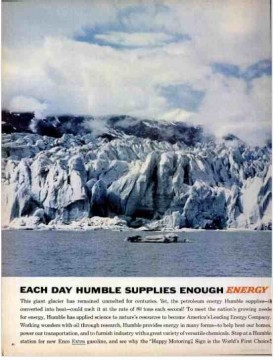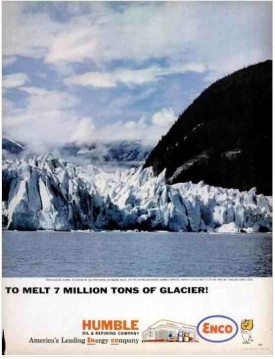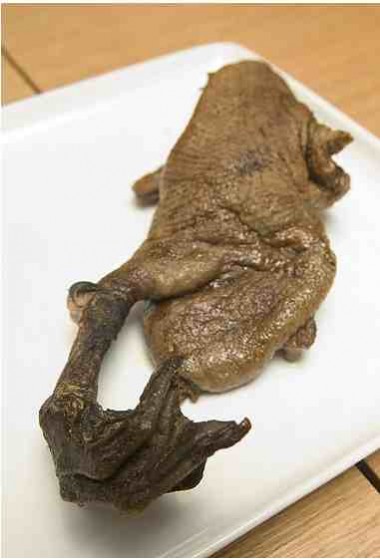Natural Resources
Regretably Prophetic Oil Company Ad


[In two halves: click each to enlarge]
Original ad here.
Posted By: Paul - Wed Aug 01, 2012 -
Comments (11)
Category: Business, Advertising, Products, Nature, Natural Resources, Oceans and Maritime Pursuits, 1960s
Guga

The tradition.
The controversy.
The taste.
Eating guga is an experience that can produce a lump in the throat, tears in the eyes. Tears of nostalgia, to those for whom it is part of a cultural identity - for others, simply a response to the urge to regurgitate.
The guga is a fishy-tasting seabird, highly prized in its own area for its unique taste. Yet to others living a mere 20 miles away, it is incredible that something so foul can even be taken into the mouth, let alone enjoyed.
The guga, however, is unique to the Isle of Lewis. When exiles meet in far-flung places, the talk soon turns to guga and memories of sharing this . . . delicacy. As the ache of nostalgia creeps in, soon they long to plunge knife and fork into this plump seabird, a 3lb baby gannet. And so it is that barrels of guga, salted down in the summer, wend their way across the world to destinations as far away as New Zealand to bring a taste of home (the sweaty, fishy, oily taste of the scuppers of a fishing smack).
Posted By: Paul - Tue Aug 09, 2011 -
Comments (7)
Category: Food, Regionalism, Foreign Customs, Europe, Natural Resources
Weird Science – From Whales To Sails

Sperm whales are still the largest animal ever to have teeth, but today their diet consists mostly of squid – including the infamous giant squid – and therein lies a problem. Whereas most land dwelling creatures live on plant material, or some juicy meaty derivative thereof, and hence are essentially “carbon-neutral”, marine animals from penguins to whales feast upon carbon that was probably sequestered in the oceans hundreds if not thousands of years ago, or has weathered out of rocks that are millions of years old. One upshot of this is that carbon dating is notoriously inaccurate on marine organisms, what scientists call the “reservoir effect”, another is that unlike water breathers such as fish, who return this carbon to the oceans, air breathing animals like whales will release this carbon to the atmosphere as CO2 and so contribute to global warming. However in new research published by the Royal Society of London, researchers have calculated that whales have actually offset their carbon emissions with emissions of another kind. Whale poop is iron rich and comparatively liquid, hence returns the excess iron in the whale’s diet back to the oceans in a form that is readily usable by phytoplankton. The team, led by Trish Lavery of Flinders University in Australia, estimate that sperm whales are responsible for removing 200,000 more tonnes of carbon from the atmosphere annually than they actually emit (Royal Society).
But it’s not all good news for the tree-huggers for while whales might be a boon in the fight against climate change, their free-range, organic farming practices of preference are almost certainly not. In a paper published by the National Academy of Sciences, Jennifer Burney of Stanford University and her colleagues have found that intensive farming is by far the most land and carbon efficient method of agriculture. Because agricultural land use is a major contributor to global warming, increasing the yields from farmland, and thereby reducing the amount of land farmed, strongly outweighed the extra carbon emissions of the intensive farming needed to achieve this. Doing the sums on farm outputs since 1961, the team found that increased yields have produced the same as cultivating an additional area the size of Russia at 1961 levels, which would have led to the release of 590 billion more tonnes of CO2, equal to about a third of all man-made emissions since the industrial revolution (PNAS).
And modern farming may be coming to our rescue in another way, as a source of cheap batteries. Almost since Ben Franklin gave up kite-flying, kids in schools the world over have been making batteries out of apples or a potatoes. Now a trio of researchers from the Hebrew University of Jerusalem, led by Alex Goldberg, have found a way to turn these vegetable power sources from classroom curiosities into a viable product. What’s more amazing is the method they discovered to generate a tenfold increase the output of their potato power-pack, they boil the potato first. How did no-one think of this before (AIP)?
Another new idea, albeit a less welcome one, is that one should prosecute scientists for not knowing everything. At least that seems to be the approach taken by the public prosecutors of the Italian city of L’Aquilla, which last year was hit unexpectedly by an earthquake that killed over 300 people and injured 1600 more. The defendants include the head of Italy’s National Institute of Geophysics and the director of the National Earthquake Center along with four other equally prominent scientists and Bernardo De Bernardinis then deputy head of the Civil Protection Agency, who together are looking at being tried for manslaughter for not alerting the population to the imminent disaster at a meeting held one week before the quake struck. It was Bernardinis, a government official, who claimed in a press conference held immediately after the meeting that the scientists had said there was “no danger”, despite the minutes of the meeting clearly showing that at no time was the chance of a major shock ever ruled out (Nature).
More in extended >>
Posted By: Dumbfounded - Fri Jul 02, 2010 -
Comments (7)
Category: Agriculture, Animals, Dinosaurs and Other Extinct Creatures, Farming, Disasters, Exercise and Fitness, Food, Government, Health, Nature, Natural Resources, Science, Psychology, Excrement
Great News For The Environmentally Unconscious

Posted By: Nethie - Tue Jun 16, 2009 -
Comments (5)
Category: Inventions, Science, Technology, Natural Resources
Follies of the Mad Men #52
[From Life magazine for March 27 1944. Two scans, top and bottom.]
Yes, natural resources will never run out, power will be "too cheap to meter," the utilities love you, and winged cherubs will attend milady's bath.
Posted By: Paul - Sat Jan 17, 2009 -
Comments (2)
Category: Business, Advertising, Utilities, Domestic, 1940s, Natural Resources

| Who We Are |
|---|
| Alex Boese Alex is the creator and curator of the Museum of Hoaxes. He's also the author of various weird, non-fiction, science-themed books such as Elephants on Acid and Psychedelic Apes. Paul Di Filippo Paul has been paid to put weird ideas into fictional form for over thirty years, in his career as a noted science fiction writer. He has recently begun blogging on many curious topics with three fellow writers at The Inferior 4+1. Contact Us |






